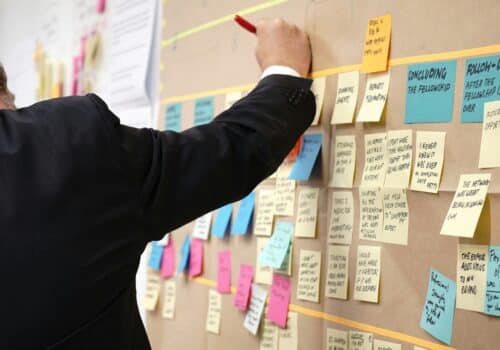ERP Implementation in Manufacturing: Top Priorities and Best Practices for Today’s Manufacturing Leaders
Manufacturing is a world of its own — and it’s a big, big world. Manufacturing companies come in all sizes, and produce everything from high tech hardware to building supplies to niche handicrafts. Yet as broad an industry as it is, most manufacturing companies have the same challenges and opportunities when it comes to ERP. In fact, successful ERP implementation in manufacturing requires leadership teams to look beyond what their direct competitors are doing and take note of where the industry as a whole is tracking.
No matter what category your manufacturing company falls into — cement, wood, make-to-order, food and beverage, metal fabrication, whatever — at some point in your company’s evolution, you can no longer get the job done with strung together, small-business software solutions. At some point, you need to select and implement a new or upgraded ERP solution.
Implementing an ERP solution isn’t just a simple software upgrade for a manufacturing company, however.
In the manufacturing industry, an ERP implementation project is a company-wide change management initiative.
And as with all change management initiatives, there are things you should think about and plan for well in advance. In this article, I’ll address the top ERP priorities for manufacturing companies today (based on experience andresearch), and give you the ERP implementation best practices we use with Syte Consulting Group clients.
ERP Priorities for Manufacturing
A manufacturing operation must approach an ERP implementation project differently than other industries because they have different priorities. These organizations don’t prioritize being early adopters or staying ahead of technology trends. A manufacturing organization will use what they have as long as it works because they’re investing in other areas that matter more — and they’ll wait until they can’t go any further with their existing software systems before investing in ERP.
The value of ERP in manufacturing is in:
- Being able to continue production and business management in a fast-changing marketplace
- Improving productivity
- Staying competitive (a distant third!)
In my years guiding privately held and family-owned manufacturing companies through ERP implementation projects, I’ve found that these values are aligned with a narrow set of ERP features and benefits. My recent research into ERP trends in different manufacturing categories confirmed that these priorities are almost universal across manufacturing:
- Streamlining operations
- Supply chain transparency and efficiency
- Automation to a) reduce manual re-entry of data (and reduce errors), and b) free highly skilled employees to focus their time on higher-value activities
- Optimizing inventory management
- Better metrics and reporting for improved productivity and decision-making
On the surface, this list is a great starting point for planning an ERP implementation project. When I talk to CFOs, however, there is one more priority I make sure to bring up — a priority that’s not often talked about in ERP literature, but can make a massive difference in how the ERP project goes:
An ERP solution is a long-term asset, and can often be capitalized to maximize the return on your financial investment.
Best Practices for ERP Implementation in Manufacturing
With those values, priorities and benefits in mind, let’s talk about best practices for ERP implementation in manufacturing.
Plan ahead
An ERP implementation project can take months or years to complete, and it can be difficult to think that far ahead. But you have to. Plan the resources you’ll need for the implementation (leadership, operational, project management, etc.) and then plan the resources you’ll need post-implementation, too.
Planning ahead is the only way to avoid getting stuck in triage/support mode indefinitely after the initial ERP implementation. It’s a lifesaver!
Practice change management
Though you’re dealing with software, hardware, and IT infrastructure, an ERP project is not actually a technology initiative. It’s a change management initiative. A new or upgraded ERP will affect people across the company — not just those who use the software every day. This change to their everyday work life can stir a lot of emotions, from excitement to resentment to grief. In an ERP implementation project, we’re not just putting new technology in place, we’re guiding people through the change that it brings about.
Take a note from the experts on the psychology of change, and approach your ERP implementation project with a change management mindset.
Get clear on where implementation falls in the process
Contrary to what many manufacturing leaders believe, implementing your new ERP solution is only the beginning! If your plan stops here, you might be in trouble.
After ERP go-live, you can expect to have plenty to do, including working through backlog items, fine-tuning features, and addressing new issues as they arise. We approach this with a long term, continuous improvement mindset because we believe that in order to achieve the maximum return on investment, your ERP should evolve as your business evolves and grows. In fact, we recommend putting a focused team or group in place after go-live to direct and execute these ongoing projects. This ensures that operations can focus on the day to day, but also that future projects are aligned with company priorities and managed effectively (including budget management).
After initial implementation, your organization will also transition to daily operations with the new ERP. As with any software, support and maintenance will be ongoing, whether you have tech support in-house or not. To sustain daily operations, manufacturing organizations should consider reports, break/fix, and end-user support as part of implementation planning.
As ERP consultants, it’s our responsibility to help our clients prepare their people, processes, and technology not just for implementation — but for all the stages that follow.
ERP Implementation Best Practices: A Short Checklist
To recap, here are the best practices for ERP implementation in manufacturing:
- Plan resources for the present and the long-run
- Approach the project with a change management mindset
- Recognize that implementation is only the beginning!
The manufacturing industry faces different challenges than other industries — but one thing remains true across sectors: It’s critical to get expert help from a vendor-agnostic partner when you implement an ERP solution. There are too many moving parts for even the most tech-savvy leader to plan for alone, and solution vendors often make big promises they don’t have the capabilities to keep.
Don’t go this alone. Schedule a complimentary collaboration session with me right here, and let’s talk about how to get your company going in the right direction right out of the gate.
ERP Readiness Self-Assessment
Is your organization ready for a new or upgraded ERP solution? Find out with this complimentary self-assessment.
Doing Business Better
You strive for excellence, believe in your people, and want to do things right the first time. And you know that you need help to get to the heart of your business challenges and make the best choices for the future of your privately held manufacturing and distribution company. That’s where we come in.
We help you focus and find exactly the right path to accelerated growth and sustainable success — from your people to your processes to your ERP software.



